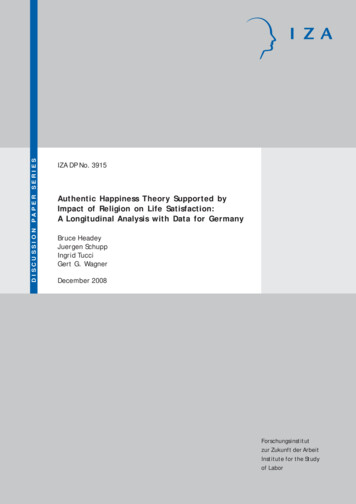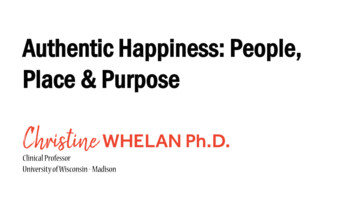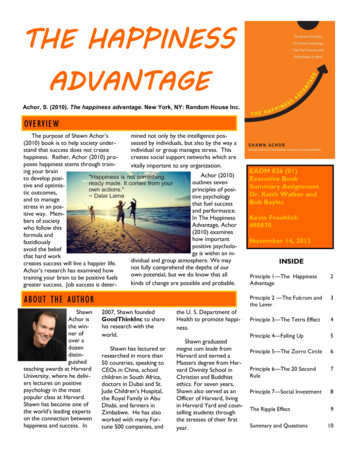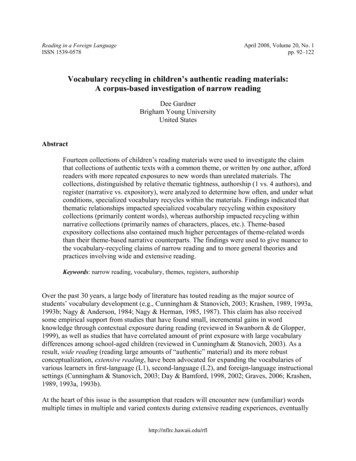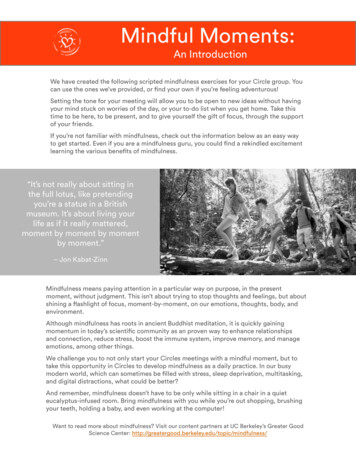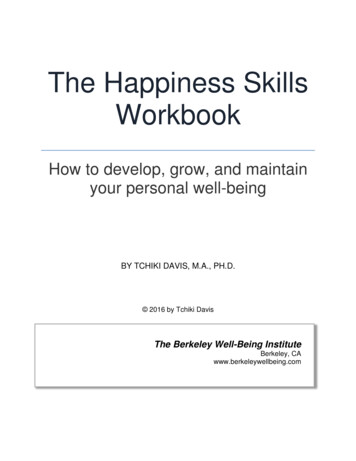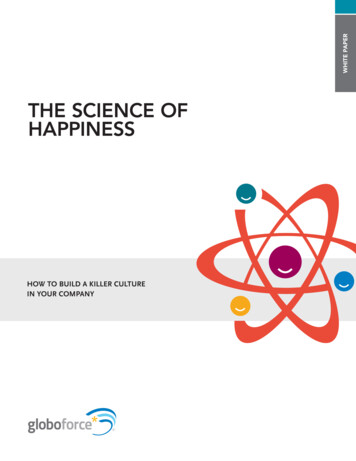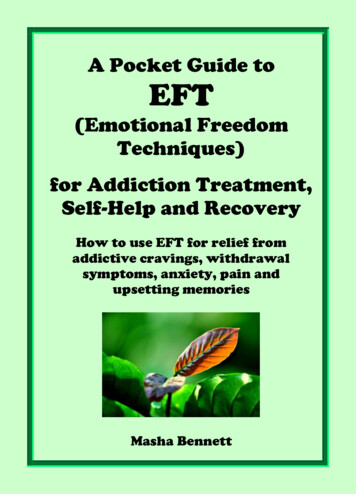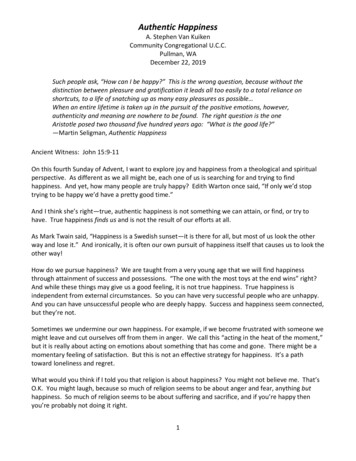
Transcription
Authentic HappinessA. Stephen Van KuikenCommunity Congregational U.C.C.Pullman, WADecember 22, 2019Such people ask, “How can I be happy?” This is the wrong question, because without thedistinction between pleasure and gratification it leads all too easily to a total reliance onshortcuts, to a life of snatching up as many easy pleasures as possible When an entire lifetime is taken up in the pursuit of the positive emotions, however,authenticity and meaning are nowhere to be found. The right question is the oneAristotle posed two thousand five hundred years ago: “What is the good life?”—Martin Seligman, Authentic HappinessAncient Witness: John 15:9-11On this fourth Sunday of Advent, I want to explore joy and happiness from a theological and spiritualperspective. As different as we all might be, each one of us is searching for and trying to findhappiness. And yet, how many people are truly happy? Edith Warton once said, “If only we’d stoptrying to be happy we’d have a pretty good time.”And I think she’s right—true, authentic happiness is not something we can attain, or find, or try tohave. True happiness finds us and is not the result of our efforts at all.As Mark Twain said, “Happiness is a Swedish sunset—it is there for all, but most of us look the otherway and lose it.” And ironically, it is often our own pursuit of happiness itself that causes us to look theother way!How do we pursue happiness? We are taught from a very young age that we will find happinessthrough attainment of success and possessions. “The one with the most toys at the end wins” right?And while these things may give us a good feeling, it is not true happiness. True happiness isindependent from external circumstances. So you can have very successful people who are unhappy.And you can have unsuccessful people who are deeply happy. Success and happiness seem connected,but they’re not.Sometimes we undermine our own happiness. For example, if we become frustrated with someone wemight leave and cut ourselves off from them in anger. We call this “acting in the heat of the moment,”but it is really about acting on emotions about something that has come and gone. There might be amomentary feeling of satisfaction. But this is not an effective strategy for happiness. It’s a pathtoward loneliness and regret.What would you think if I told you that religion is about happiness? You might not believe me. That’sO.K. You might laugh, because so much of religion seems to be about anger and fear, anything buthappiness. So much of religion seems to be about suffering and sacrifice, and if you’re happy thenyou’re probably not doing it right.1
There’s this great saying by Marty Babcock that I like.Jesus promised only three things if we follow him. That we would be1) utterly fearless, 2) absurdly happy and 3) always in trouble.We often forget that second one. Religion can turn the spiritual journey into such a chore. Religiouspeople can be such a downer sometimes and forget that the whole point is about this deepcontentment and absurd happiness that awaits us. Yet the spiritual quest is often not what we expectit to be.There’s a wonderful little French film, Ponette, that is a story of a small girl who loses her mother in acar accident and her grief, loneliness and unhappiness that follows. She turns to God in herdesperation and begs to see and talk to her mother once more.There’s a scene where she goes to her mother’s grave and weeps, digging up the earth with her barehands. And suddenly her mother appears to her.“Happy spirits never die,” she explains to Ponette. “Stop crying. Stop complaining. I don’t want a sadchild.”Her mother continues, “No one likes neglectful children. What is a neglectful child?” Ponette answers:“One who forgets to laugh?” “Exactly!” says her mother.Later, when Ponette tells her father about her conversation with her mother, he asks her what hermother said. Ponette responds, “She told me to learn to be happy.”Happiness, to a large extent, is something we learn.Jesus taught his followers how to be happy. He talked about living in a state free of anxiety and fear.He talked about being full of joy and peace. He referred to this as the kingdom of God, the sacredrealm. It is a place that is within us all, a place that we all can enter. When we are in this place, we arereleased from anger and fear, and have freedom to love others and courage to act with integrity. InJohn’s portrait Jesus says,I have said these things so that my joy may be in you, and that your joy may be complete.(John 15:11)It is true that Jesus was called “a man of sorrows and acquainted with grief.” He was persecuted; hesuffered; and he was tortured. And yet, he knew the secret of happiness. How is this possible? Someof my favorite images of Jesus are of him smiling or laughing. These are rare. I think I know why.They are rare because religion has a tendency to get off track. But so much of what Jesus taught isabout finding happiness—true, undiluted happiness.Now I know what some of you are thinking. You’re thinking, “Oh, please.” Maybe you’ve been inchurches that are called “praise” churches. And perhaps it just doesn’t seem real to you. I’m that way,2
too. To me, it seems too put on sometimes. Too forced. People are shouting “hallelujah,” but often itdoesn’t quite ring true with me. So much of it seems to be out of conformity. It can appear to besuperficial and ignore the negatives of life.Joy is not a cover-up, but it co-exists with sadness, anger and fear. In the movie, The Life of Brian, byMonty Python, there is a scene near the end with all these people being crucified on crosses. And theybegin snapping their fingers and sing, “Always look on the bright side of life.” They were criticized forbeing sacrilegious. But what they were doing was satirizing a positive-thinking, put-on-a-happy-facetheology. True joy is not the momentary emotion of happiness, rather it is the profound experience offulfillment. It is a state of being.I’m not talking about happiness as a feeling. Psychology says there are four basic human emotions:mad, sad, glad and afraid. (Interesting to notice, by the way, that three of the four are negative, isn’tit?) The happiness of spiritual awareness is not one of those emotions that float around the surface ofour consciousness. Happiness is a state of being, a deep undercurrent of contentment that flows nomatter what might be happening on the surface.There are famous words of Jesus called the “sermon on the mount.” These sayings in the first part ofthe sermon are known as “the beatitudes.” Most of you would recognize these sayings with the word,“blessed.” But sometimes I use a translation that has the word, “happy” instead, because to blessmeans to confer happiness upon someone. But it’s not the kind of happiness we normally think of—ahappiness that is externally-based, tied to circumstances, a feeling. Rather it is an internally-basedstate of contentment that is deeper than emotion. So maybe that’s why translators avoided the word,“happy.”And we can take a look at the beatitudes again and see, according to Jesus, what truly happy peoplelook like. Now you may have a picture in your mind about what happy people look like. They havetheir lives together, maybe. Organized, together, successful, admired by others. Things are workingout for them, good health. They have lots of stuff—nice home, nice cars, vacations, summer homes.Imagine happy people.Now take a look at Jesus’ portrait. I bet you that it’s quite different from what you imagine. Happy arethe poor in spirit, those who are ready to give up, at the end of their ropes, depressed, discouraged Wait a minute! This is not the picture of happiness we had in mind.Luke’s version has Jesus saying, “Happy are the poor,” the destitute, the hungry, those withoutpossessions, the unemployed, struggling financially, the homeless, the losers. Wait a minute! Do theselook like the happy people to you?Happy are those who mourn, those who weep, and those inconsolable in their grief. How can this be?Happy are you who are persecuted, who are reviled, hated, excluded and defamed—when peoplespread evil lies about you.Wow! If these are the happy ones, I’d hate to see the unhappy ones! Or maybe we just have thewrong idea of what happiness is. Maybe what we call our happiness is really a chain that holds usback.3
Here’s a question: Would you be willing to trade all you good stuff—your successes, career, health,relationships or money—for true happiness? Would you do it? Now I’m not saying this is somethingwe have to do to find happiness; this is a hypothetical question. I’m like most people, I think. Iwouldn’t trade. Most of me still believes in the counterfeit version of happiness.This sheds some light on one of the most problematic sayings of Jesus:Whoever comes to me and does not hate father and mother, wife and children, brothers andsisters, yes, and even life itself, cannot be my disciple. (Luke 14:26)What? It’s not that I couldn’t go there sometimes, but certainly Jesus would want us to love,appreciate and honor those relationships. Savor them, even. But perhaps the way this lines up withJesus’ teaching is that as good as all these are, as important and as precious as they are, we cannotcling to them and hook our happiness to them. To be a disciple of Jesus is to recognize that even thevery best that life has to offer is not indispensable. One cannot make any of these a condition for one’scontentment and comfort. As the poet Blake wrote:He who binds to himself a joyDoes the winged life destroy.But he who kisses the joy as it fliesLives in eternity’s sunrise.Today I’m preaching—I’m appealing—to that other side of me, of us. That smaller, hidden part of us.Here’s the message of the gospel that often we say we believe, but not really: We already have whatwe need for happiness. This is not very believable, is it?But this is the message of Jesus. We already have what we need for happiness, but we block it outbecause of our own ignorance. I don’t want to be insulting, but it’s true. Don’t be too hard onyourselves, though. We have been given the wrong ideas, the wrong script. So we’ve been trained tobe ignorant, even though most people call this being “smart.” According to Jesus, the truly smart andwise ones are the animals, plants and babies. And the ignorant ones are learned adults, priests,pastors and successful people. No wonder Jesus got killed!I read a book recently by Matthieu Ricard called, Happiness: A Guide to Developing Life’s MostImportant Skill. Ricard is a Buddhist monk who left his career in France in cellular genetics to studyBuddhism in the Himalayas 40 years ago.He recounts an old story about the son of a king in Persia who was raised alongside the son of thegrand vizier, and they became close friends.When the prince ascended the throne “please write a history of the world so I can get the necessarylessons and know the proper way to act.”He consulted historians and scholars. Five years later: 36 volumes.4
“How will I ever have time to read them? please condense it.”Two years later (kingdom at war): ten volumes. abridge it further!Worked three years: a single volume. But king was caught up in legislating. “Bring me tenfold fewerpages so I can read it in an evening.”Two years later, it was done. King bedridden, in dreadful pain. Both were old. King with his dyingbreath: “Well, the history of humanity?”He gazed steadily at his friend, and he said, “They suffer, Majesty.”“Buddhist texts say that in the cycle of death and rebirth, no place, not even one the size of a needle’spoint, is exempt from suffering.”Authentic happiness is found when suffering isn’t just superficially glossed over, but when it iseliminated at its source by practicing the path. It is a path of continual learning and integrating.Ricard says, “The search for happiness is not about looking at life through rose-colored glasses orblinding oneself to the pain and imperfections of the world it is the purging of mental toxins it isabout learning how to put things in perspective ”Happiness, he says is a state of being that is not dependent on external events.There exists a way of being that underlies and suffuses all emotional states, that embraces allthe joys and sorrows that comes to us The Sanskrit word for this state of being is sukha.Sukha is the state of lasting well-being that manifest itself when we have freed ourselves ofmental blindness and afflictive emotions.One of Ricard’s teachers said, “Those who seek happiness in pleasure, wealth, glory, power and heroicsare as naïve as the child who tries to catch a rainbow and wear it as a coat.”As a spiritual community, we try not to play into this naiveté. As a teacher I try to offer something alittle more substantial. “When you spend your time trying to fill a leaky barrel,” says Ricard, “youneglect the methods and above all the ways of being that will allow you to find happiness withinyourself.” Let’s not try to fill a leaky barrel, let’s practice dropping our attachments—those things wethink we need to be happy—and discover a deep, abiding and authentic happiness.5
Authentic Happiness A. Stephen Van Kuiken Community Congregational U.C.C. Pullman, WA December 22, 2019 . Happiness, to a large extent, is something we learn. Jesus taught his followers how to be happy. He talked about living in a state free of anxiety and fear. He talked about being full of joy and peace. He referred to this as the kingdom of God, the sacred realm. It is a place that is .
